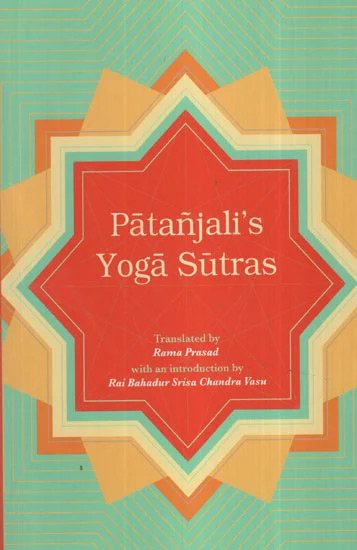Yoga-sutras (with Vyasa and Vachaspati Mishra)
by Rama Prasada | 1924 | 154,800 words | ISBN-10: 9381406863 | ISBN-13: 9789381406861
The Yoga-Sutra 2.21, English translation with Commentaries. The Yoga Sutras are an ancient collection of Sanskrit texts dating from 500 BCE dealing with Yoga and Meditation in four books. It deals with topics such as Samadhi (meditative absorption), Sadhana (Yoga practice), Vibhuti (powers or Siddhis), Kaivaly (isolation) and Moksha (liberation).
Sūtra 2.21
Sanskrit text, Unicode transliteration and English translation of Sūtra 2.21:
तदर्थ एव दृश्यस्यात्मा ॥ २.२१ ॥
tadartha eva dṛśyasyātmā || 2.21 ||
tad—his. arthaḥ—purpose. tadarthaḥ—for his purpose. dṛśyasya—of the knowable, ātmā—being, existence.
21. For his purpose only is the being of the ‘knowable.’—72.
The Sankhya-pravachana commentary of Vyasa
[English translation of the 7th century commentary by Vyāsa called the Sāṅkhya-pravacana, Vyāsabhāṣya or Yogabhāṣya]
[Sanskrit text for commentary available]
The knowable comes out as the object of the Puruṣa appearing as an act of consciousness. For his purpose only, therefore, is the being of the knowable. The meaning is that it possesses the nature it does, for that purpose. Its nature, however, depending as it does upon another for its existence as such, is not cognized by the Puruṣa when the objects of achieving the purposes of enjoyment and emancipation are over. This would seem to imply that it is destroyed, because what constitutes its very being is thus done away with. But it is not destroyed.—72.
The Gloss of Vachaspati Mishra
[English translation of the 9th century Tattvavaiśāradī by Vācaspatimiśra]
Having described the nature of the knower and the knowable, now he says that the knowable exists for the knower, showing as this does in part the relationship existing between the two, the relation, that is to say, of the lord to his possessions. ‘For this purpose only is the being of the knowable.’ He explains it:—‘The knowable comes out as the object of, i.e., being enjoyable by the enjoyer, the Puruṣa, appearing as an act of consciousness.’ For this reason the existence of the knowable is for his purpose only, i.e., for the purpose of the knower alone, and not for the purpose of the knowable.
(The word translated here as the being is in the original Ātmā, the self. Hence arises the question, How can the self exist for the self?) For this reason he says:—Possesses the nature it does for that purpose. This is the meaning:—The knowable being of the very nature of pleasure and pain, is the enjoyable. Pleasure and pain which consist in being of the same class with the then prevailing mental habit, are in reality put up as such for his purpose only. The objects also such as sound, &c., cause pleasure and pain only because they also are of the nature of the knowable. And it is not themselves that are to be pleased or pained, because in that case these modifications would act as contrary to themselves. By the canon of residues, therefore, the power of consciousness only can be opposed or favoured. Therefore the being of the knowable is for the purpose of the Puruṣa only and not for the purpose of the knowable itself.
It is because the being of the knowable is for the purpose of the Puruṣa and not for the purpose of the knowable itself, that its nature acts to that purpose until that purpose of the Puruṣa is achieved; and ceases to act when that purpose has been achieved. For this reason he says:—‘Its nature, however, &c.’ In itself the knowable is unintelligent. It is ensouled by another, by consciousness which is the nature of the self. “Ensouled by consciousness” means that its nature as such is informed thereby. When enjoyment and emancipation have been achieved, it is no longer seen by the Puruṣa. Enjoyment is the experience of sound, &c., as pleasure and pain, &c. Emancipation is the direct knowledge of the distinction between the Puruṣa and Objective Existence (sattva). The Will-to-be is unintelligent and by itself does not know either. It is only by the reflection of the Puruṣa into itself that it does so. The enjoyment and the direct knowledge of the distinct nature of the Puruṣa and Objective Existence, belong therefore to the Puruṣa Himself. Thus when the enjoyment and emancipation of the Puruṣa have been achieved, the purpose of the existence of the knowable no longer remains. The enjoyment and emancipation have no longer to be achieved. Hence it has been said:—‘When the object of achieving enjoyment and emancipation has been achieved, &c.’
In this connection he raises a doubt:—‘It would follow, &c.’ and refutes it:—‘But it is not destroyed.’—72.
